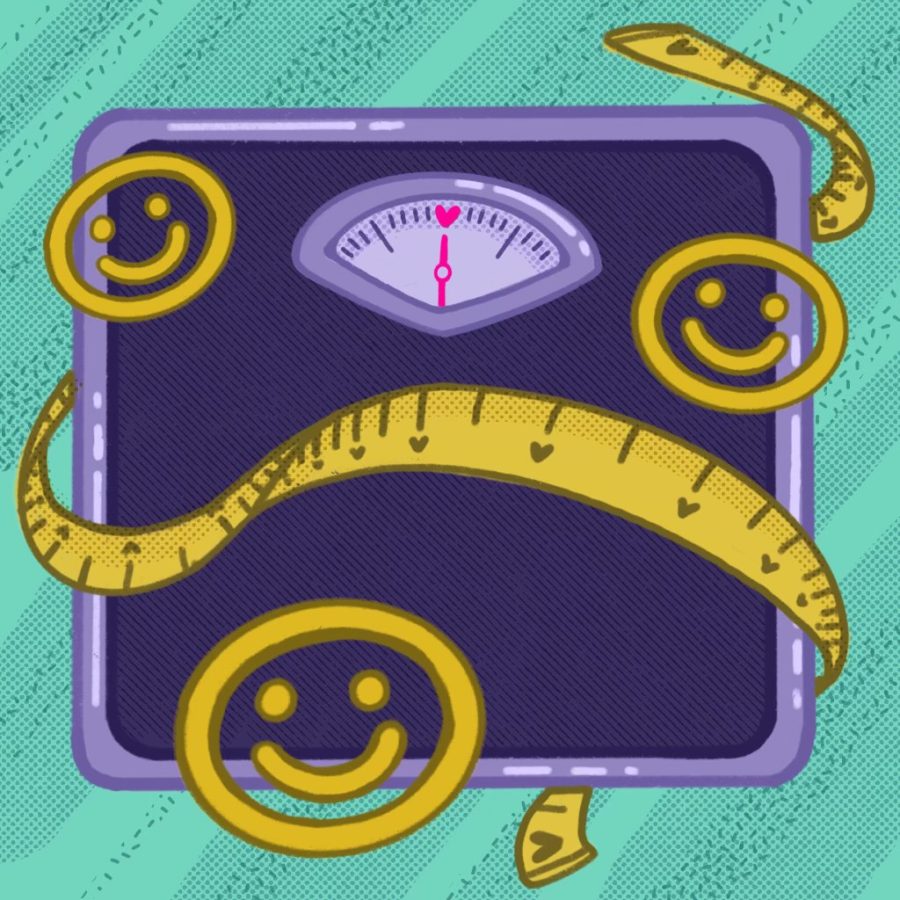Positive weight gain and the misconception of the scale
Instead of staring at those numbers on the scale, consider all the good your weight can do for you
October 8, 2021
I just gained ten pounds.
Someone in your life, or maybe even you, might be the one saying those words. However, as we say them, do we even know what they mean? What one weight means to one person could mean something different to another. Despite this, society tends to praise the loss of weight or being in specific weight ranges. People forget all about positive weight gain, which can be beneficial for some people if they learn to look past the number on the scale.
I decided to do a short experiment with fifteen of my friends to see how different people would view weight distribution. To do so, I asked them to guess my weight as accurately as possible. Compared to my actual weight, answers ranged from 26 pounds too low to over 14 pounds too high. That’s a difference of 40 pounds between the highest and lowest guesses. Some of these guesses were even numbers that would be underweight for my height.
People in society tend to praise even a ten-pound weight loss, but if people don’t even have a visual of what these numbers mean, do they really hold that much value? According to Banister Nutrition, a muscle’s higher density means that when there is the same volume of fat and muscle, the muscle will weigh more. Two people can be the same height and even the same weight, but look vastly different based on their body composition and amount of muscle versus fat.
People need to reevaluate their perception of themselves based on their weight because weight in itself is such an arbitrary number. People may hold themselves back from what’s healthy for them because they are too afraid to reach a certain number on the scale.
Andrea Boldt of Healthfully lists benefits of weight gain in contrast to being underweight as a better quality of life, more energy, performance and fertility. BMI is used as a guide by many doctors, but it can’t tell what a healthy range is for someone based on their lifestyle. If someone is underweight, they risk compromising their immune system. Someone who is underfed will feel undernourished, weak and fatigued. Even those at a technically healthy weight according to BMI might benefit from weight gain if it means they are getting the proper number of calories. If someone doesn’t eat enough calories, the body has to conserve energy just to run essential functions. When it comes to weight, not having enough calories is a matter of limiting both physical and mental energy. Gaining weight allows you to gain more muscle. Strength can help you in sports, real-life situations or to be less fragile in later life. Food is fuel. People don’t try to drive a car on an empty tank, so why should people do that to themselves to try to meet a weight goal or stay at a specific BMI?
Food is fuel. People don’t try to drive a car on an empty tank, so why should people do that to themselves to try to meet a weight goal or stay at a specific BMI?
Someone who might be in the healthy range for BMI but who has disordered tendencies may also benefit from positive weight gain. This is because for every person, there is a large range of weights that will be healthy for them and there is no reason to try to stick to the lowest one possible. Weight and your appearance do not necessarily represent performance, even in sports.
Regardless, mental health should be prioritized. With Suicide Awareness Month coming to a close, it is important to remember to take care of yourself throughout the year. A “healthy-seeming” weight may really be an undernourished person who can’t focus. Not eating enough can be linked to mental illness. The National Centre for Eating Disorders said, “Under-eaters generally feel depressed, low and prone to be easily irritated or enraged.”
The scale has taught so many people to strive for a lower weight, but positive weight gain is forgotten. People can’t enjoy life and food if all they are thinking about is the calories and avoiding weight gain. If people are meant to gain weight for the sake of their health, sometimes it needs to happen. A healthy lifestyle is one where you can eat food that makes you feel good physically and mentally without having to become overwhelmingly anxious about it. Far too many people are stuck in cycles of disordered eating and even avoiding social interaction to avoid food. Having a few extra pounds of fat is far more worth it than the misery of having an unhealthy relationship with weight and food. Weight gain and fat themselves are so stigmatized when in reality some people need to gain weight for the sake of their physical and mental health and they shouldn’t feel ashamed of it.












